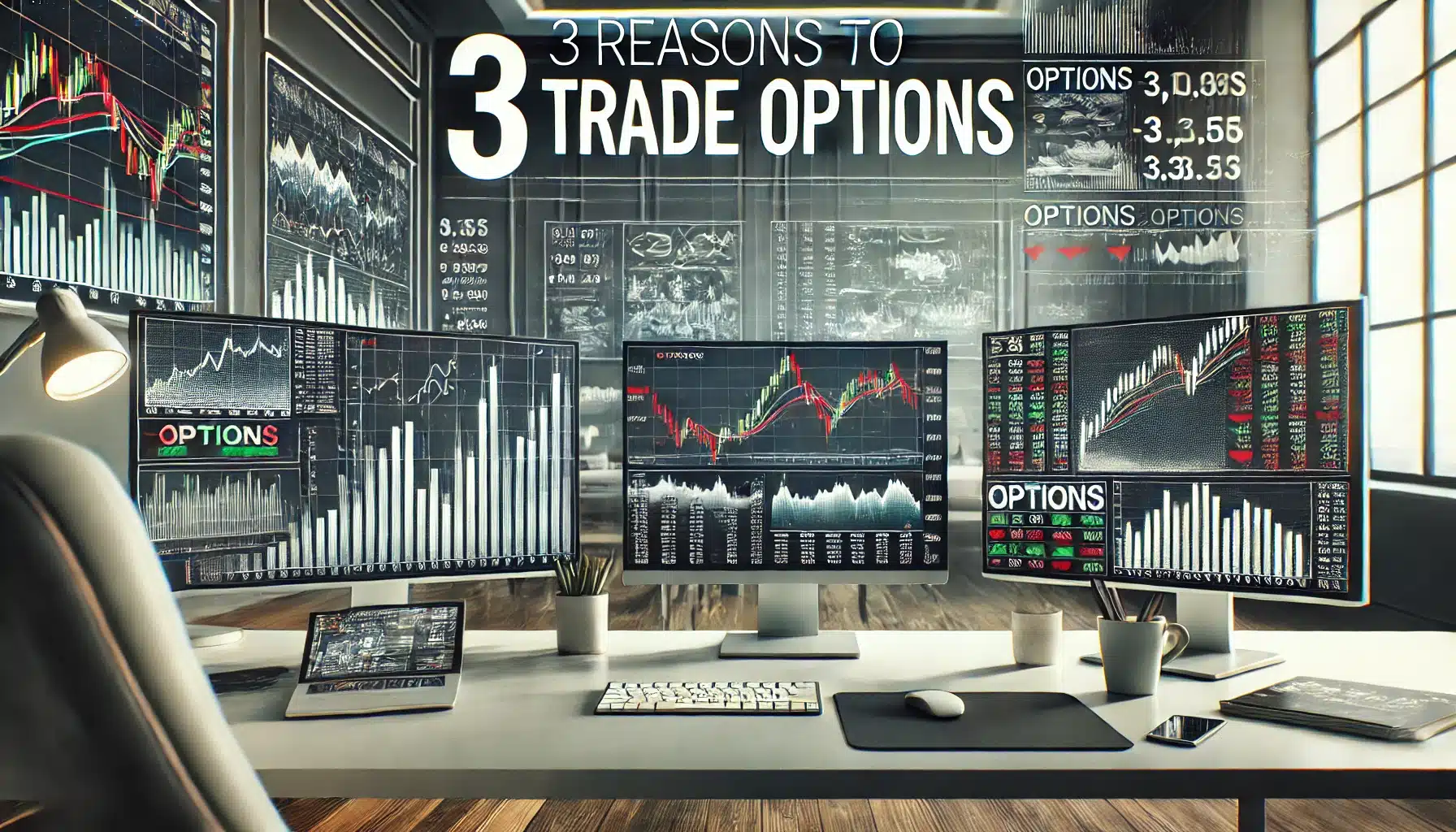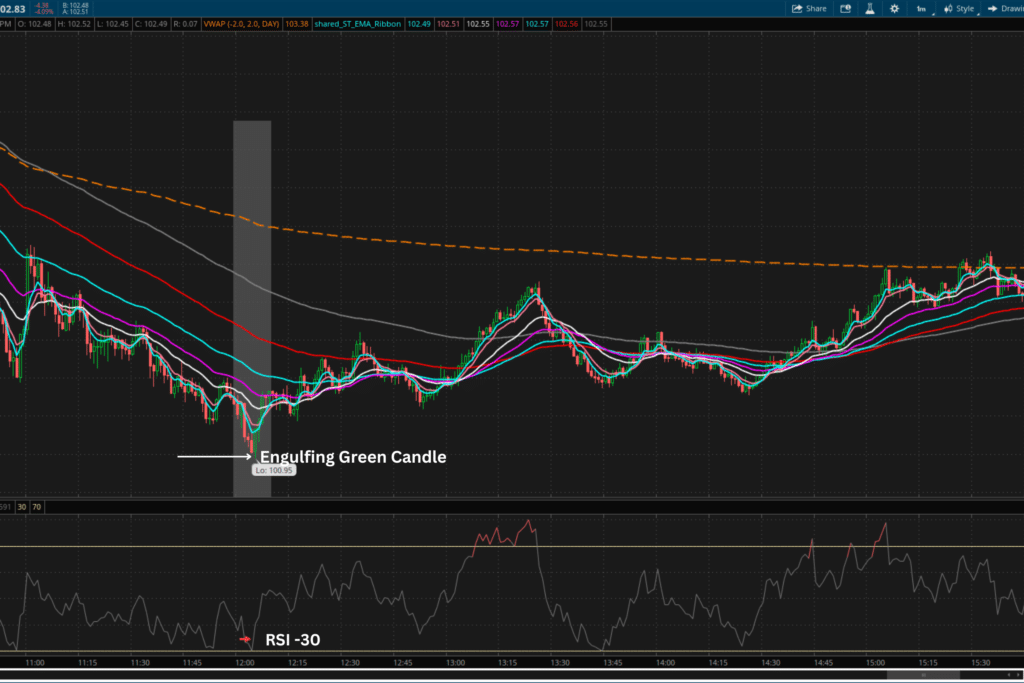3 Reasons to Trade Options
3 Reasons to Trade Options

Investors and traders undertake option trading to hedge open positions or to speculate on likely price movements of an underlying asset. For example, they might buy puts to hedge a long position or buy calls to hedge a short position.
The biggest benefit of using options is that of leverage. For example, say an investor has $900 to use on a particular trade and desires the most bang-for-their-buck. The investor is bullish on XYZ Inc in the short term. So, assume XYZ is trading at $90. Our investor can buy a maximum of 10 shares of XYZ. However, XYZ also has three-month calls available with a strike price of $95 for a cost of $3. Now, instead of buying the shares, the investor buys three call option contracts. Buying three call options will cost $900 (3 contracts x 100 shares x $3).
Shortly before the call options expire, suppose XYZ is trading at $103, and the calls are trading at $8, at which point the investor sells the calls. Here’s how the return on investment stacks up in each case:
- Outright purchase of XYZ shares at $90: Profit = $13 per share x 10 shares = $130 = 14.4% return ($130 / $900).
- Purchase of three $95 call option contracts: Profit = $8 x 100 x 3 contracts = $2,400 minus the premium paid of $900 = $1,500 = 166.7% return ($1,500 / $900).
Of course, the risk with buying the calls rather than the shares is that if XYZ had not traded above $95 by option expiration, the calls would have expired worthless, and all $900 would be lost. XYZ had to trade at $98 ($95 strike price + $3 premium paid), or about 9% higher than its price when the calls were purchased, for the trade just to break even. When the broker’s cost to place the trade is also added to the equation, to be profitable, the stock would need to trade even higher.
American Options
These scenarios assume that the trader held till expiration. That is not required with American options. At any time before expiry, the trader could have sold the option to lock in a profit. Or, if it looked like the stock was not going to move above the strike price, they could sell the option for its remaining time value to reduce the loss. For example, the trader paid $3 for the options, but as time passes, if the stock price remains below the strike price, those options may drop to $1. The trader could sell the three contracts for $1, receiving $300 of the original $900 back and avoiding a total loss.
The investor could also choose to exercise the call options rather than selling them to book profits/losses, but exercising the calls would require the investor to come up with a substantial sum of money to buy the number of shares their contracts represent. In the case above, that would require buying 300 shares at $95.
Selecting the Right Option
Here are some broad guidelines that should help you decide which types of options to trade.
Bullish or Bearish
Are you bullish or bearish on the stock, sector, or broad market you wish to trade? If so, are you rampantly, moderately, or slightly bullish/bearish? Making this determination will help you decide which option strategy to use, what strike price to use, and what expiration to go for.
Volatility
Is the market calm or quite volatile? How about Stock ZYX? If the implied volatility for ZYX is not very high (say 20%), then it may be a good idea to buy calls on the stock, since such calls could be relatively cheap.
Strike Price and Expiration
If you’re rampantly bullish on a certain stock, you should be comfortable buying out-of-the-money calls. For instance, assume you do not want to spend more than $0.50 per call option and have a choice of going for two-month calls with a strike price of $49 available for $0.50 or three-month calls with a strike price of $50 available for $0.47. You decide to go with the latter since you believe the slightly higher strike price is more than offset by the extra month to expiration.
What if you were only slightly bullish on this stock, and its implied volatility of 45% was three times that of the overall market? In this case, you could consider writing near-term puts to capture premium income rather than buying calls.
Option Trading Tips
As an option buyer, your objective should be to purchase options with the longest possible expiration to give your trade time to work out. Conversely, when you are writing options, go for the shortest possible expiration to limit your liability.
Lowest Price and Volatility
Trying to balance the point above, when buying options, purchasing the cheapest possible ones may improve your chances of a profitable trade. The implied volatility of such cheap options is likely to be quite low, and while this suggests that the odds of a successful trade are minimal, the option may be underpriced. So, if the trade does work out, the potential profit can be huge. Buying options with a lower level of implied volatility may be preferable to buying those with a very high level of implied volatility because of the risk of a higher loss (higher premium paid) if the trade does not work out.
Understand the Trade-Offs
There is a trade-off between strike prices and options expirations. An analysis of support and resistance levels and key upcoming events (such as an earnings release) is useful in determining which strike price and expiration to use.
Know the Sector
Understand the sector to which the stock belongs. For example, biotech stocks often trade with binary outcomes when clinical trial results of a major drug are announced. Deeply out-of-the-money calls or puts can be purchased to trade on these outcomes, depending on whether one is bullish or bearish on the stock.
It would be extremely risky to write calls or puts on biotech stocks around such events unless the level of implied volatility is so high that the premium income earned compensates for this risk. By the same token, it makes little sense to buy deeply out-of-the-money calls or puts on low-volatility sectors like utilities and telecoms.
Trade One-Off Events
Use options to trade one-off events such as corporate restructurings, spin-offs, and recurring events like earnings releases. Stocks can exhibit very volatile behavior around such events, allowing the savvy options trader an opportunity to cash in. For instance, buying cheap out-of-the-money calls before the earnings report on a stock that has been in a pronounced slump can be a profitable strategy if it manages to beat lowered expectations and subsequently surges.
How Do Options Work in Trading?
Options traders speculate on the future direction of the overall stock market or securities of individual companies. Instead of outright purchasing shares, options contracts can give you the right but not the obligation to execute a trade at a given price. In return for paying an upfront premium for the contract, options trading is often used to scale returns at the risk of scaling losses.
What Are the 4 Types of Options?
The four basic types of option positions are buying a call, selling a call, buying a put, and selling a put. A call is the right to buy a security at a given price. A trader can buy a call if they wish to own the ability to buy at a certain price. A put is the right to sell a security at a given price. Therefore, a trader can buy a put if they wish to own the ability to sell it at a certain price. On the other side of the trade is the option writer, who collects an upfront premium for entering into the contract and selling the option.
When Should You Buy Options?
Options are most useful to capitalize on volatile markets. It doesn’t matter which direction the market is going; all options traders need is price movement in one direction or the other. Generally, it’s best to enter into an option position when you expect market volatility to increase and exit an option position when you expect market volatility to decrease. This is because low price movement is not beneficial for an options contract (especially if the option is currently out of the money).
How Do Call Options Make Money?
A call option writer makes money from the premium they receive for writing the contract and entering into the position. This premium is the price the buyer paid to enter into the agreement.
A call option buyer makes money if the price of the security remains above the strike price of the option. This gives the call option buyer the right to buy shares at a price lower than the market price.
Can I Sell Options Immediately?
Options contracts can often be bought and sold during normal market hours through a broker on many regulated exchanges. As long as the market is open, you can usually buy an option and sell it the next day (assuming the market is also open the following day).
The Bottom Line
Investors with a lower risk appetite should stick to basic strategies like call or put buying, while more advanced strategies like put writing and call writing should only be used by sophisticated investors with adequate risk tolerance. As option strategies can be tailored to match one’s unique risk tolerance and return requirement, they provide many paths to profitability.
While there is no “one size fits all” strategy, the basic strategies discussed here should give you a good starting point in developing your own unique trading plan. Trading options involves unique risks, so be sure to understand them fully before using any strategy involving options.
Check out our article on:
- Introduction to Options Trading
- Mastering Butterfly Spreads
- The Power of Diagonal Spreads
- The Power of Iron Condors
- The Power of Vertical Credit Spreads
Elevate Your Trading Game
Ready to take your options trading to new heights? Whether you’re a day trader, swing trader, or busy professional, we have you covered. Join our exclusive community of traders and gain access to our comprehensive educational resources, live trading sessions, and expert analysis. We’ll guide you through the intricacies of debit spreads and other advanced options strategies, helping you achieve your financial goals. Don’t miss out on this opportunity to become a more confident and profitable trader. Sign up today!
Below are the links:
To your success.

Billy Ribeiro is a renowned name in the world of financial trading, particularly for his exceptional skills in options day trading and swing trading. His unique ability to interpret price action has catapulted him to global fame, earning him the recognition of being one of the finest price action readers worldwide. His deep comprehension of the nuances of the market, coupled with his unparalleled trading acumen, are widely regarded as second to none.
Connect with us:





